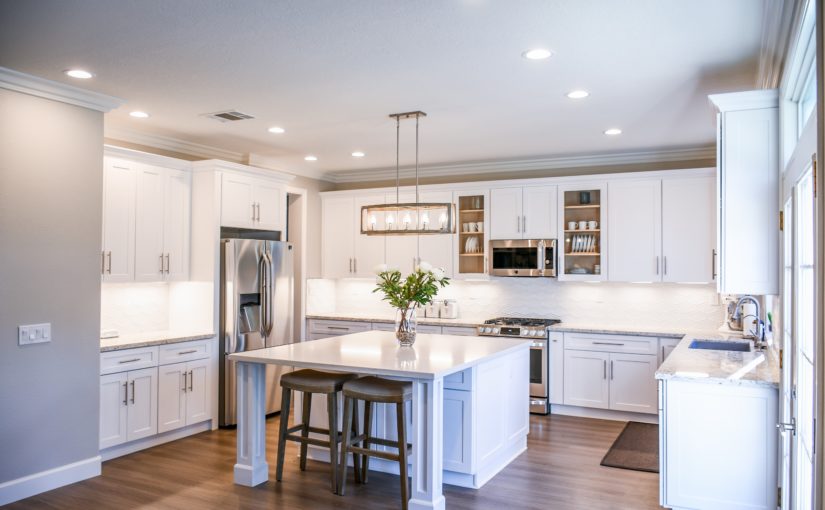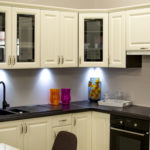Exposed concrete has gained widespread popularity over the years and it’s something that most homeowners gravitate towards. It combines beauty and functionality to provide an upscale look that looks modern and appealing. Some people even wonder if polished concrete is suitable for use inside the kitchen. To help you make an informed decision, we’ll be answering several questions pertaining to polished concrete and how you can utilize it for your kitchen applications.
Is polished concrete suitable for kitchen floors and countertops?
Yes. Depending on the style and aesthetics you’re looking for, polished concrete can work wonderfully on kitchen floors and countertops. Don’t let the look of polished concrete fool you. Even though it looks shiny and slippery, it actually provides the same level of grip concrete does (provided that you keep it clean). In fact, polished concrete offers more foot traction than linoleum or tile. Because polished concrete is a porous material, it retains its slip-resistant properties even when wet, so you shouldn’t have to worry about safety concerns in regards to polished concrete.
For countertops, polished concrete adds a bit of elegance and durability. As long as it’s sealed properly, you won’t have much trouble dealing with stains coming from coffee or sauces. Just make sure to clean the stains immediately.
Is polished concrete prone to cracking?
All concrete floors have the potential to crack, whether it be polished, untreated, or coated. Keep in mind that in a kitchen, there are temperature fluctuations which can cause the concrete to expand and contract. While this may sound concerning, you shouldn’t have anything to worry about as long as you contact a reputable installer like Fluid Concrete to install polished concrete. They’ll usually reinforce areas such as the hob or sink to reduce the likelihood of cracks.
Polished concrete is incredibly durable and can withstand the daily abuse of most kitchen tasks. Along with proper installation and sealing, expect your kitchen floors and countertops to last for years without suffering major cracks and damages.
What is the maintenance like with polished concrete?
The beauty of polished concrete goes beyond its aesthetic appeal. Its low-maintenance properties make it a perfect choice for an area that’s as busy as the kitchen. You only need to establish a routine cleaning maintenance to ensure its shine and luster. Things such as wiping the countertop and mopping the floors on a daily basis are all you need to maintain polished concrete.
Keep in mind that when dealing with stains, it’s best to use a concrete-specific cleaner. That way, you don’t damage the sealer and preserve the condition of your kitchen floors and countertops.
Does polished concrete need to be resealed?
Yes. Polished concrete requires resealing every few years to maintain its natural beauty. Think of a sealer as a barrier that protects polished concrete from dust, dirt, stains, and other contaminants that may affect its finish. Experts recommend applying a sealer every 2-5 years to keep kitchen floors and countertops in good shape. Of course this will depend on a variety of factors and only you will know when it’s time to actually reseal.
Some telltale signs that point to resealing polished concrete are hard-wearing stains, cracks, and floors that have lost its luster or shine. The concrete sealer needs to be applied evenly for maximum protection. That said, it’s best to have a professional reseal polished concrete to achieve consistent results.
Any kitchen appliances or substances that you should worry about?
When it comes to using polished concrete for kitchen applications, there’s not a lot to be concerned about. Just make sure to stay away from industrial cleaning agents as these can harm the surface of polished concrete and break down the sealant coating. Also, avoid spilling acidic substances like vinegar and juices on citric fruits since these can eat away into the surface of polished concrete.
We highly suggest using a dedicated concrete cleaner when cleaning polished concrete. This helps prevent damage from your kitchen floors and countertops while maintaining its shiny, polished finish. You can also use mild, soapy cleaning agents like dishwashing liquid to remove stains. Baking soda works great in getting rid of oily residue and grease buildup on countertops.
So, is polished concrete a good idea to use in the kitchen?
Absolutely. It’s no surprise that many people are enamored with polished concrete and for good reason. Not only is it as durable as regular concrete, but it’s also more beautiful, lending to its timeless appeal. If you’re looking to use polished concrete for your kitchen floors and countertops, you will definitely appreciate its slip-resistant and long-lasting qualities. Make sure to contact a reputable installer to avoid unwanted cracks and achieve an even finish come sealing time.







